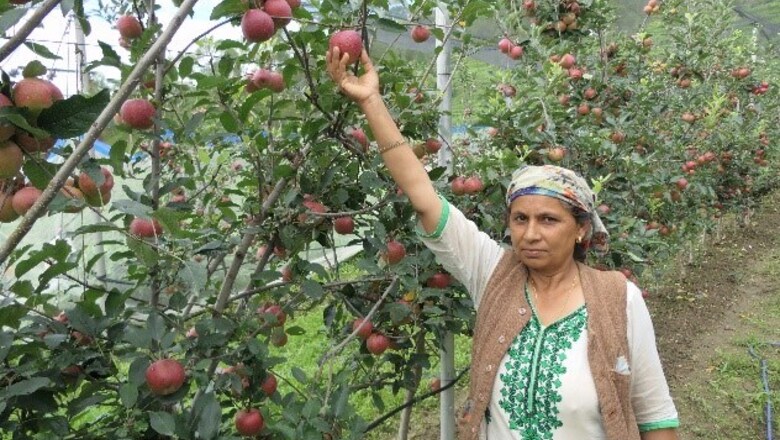
views
A farm-level productivity enhancement program, Unnati, under the aegis of Coca-Cola’s Fruit Circular Economy, aims at encouraging farmers to use ultra-high to high density fruit plantation methods coupled with modern Package of Practices (POP). Efficient use of input materials helps in more than doubling the fruit produce. Since its inception in 2011, project Unnati has been about improving the productivity of Mangoes- and gradually the program moved on to focussing on various other fruits like – Oranges, Apples and Grapes. We get talking to one of the beneficiaries, Poonam Gaur.
When did you learn about your husband having cancer? How did you manage the financial condition at home then? Did you have a stable job then?
In 2018, my husband was diagnosed with last-stage cancer, and this came as a shock to me. Soon after the diagnosis, he passed away, which was extremely devastating for me. Within a year of my husband’s passing, I lost my mother too, and at the time, I slipped into depression. I had lost the will and purpose to live, even more so as our family’s financial condition was deteriorating and I was helpless. It was getting tougher for us to sustain by the day, and I could not see any solution or sustainable source of income in sight.
The Unnati initiative came to me as a ray of hope in my life in 2020 when my children introduced me to it. I wanted to provide for my family, take care of their needs, and support them in whatever way I could. It seemed like a viable source of income with minimal investment and something I could own and run myself, which was empowering for me. I started apple farming through Ultra High Density Plantation technologies, and volunteers working for the initiative visited me and guided me through the process. I started enjoying farming, and with the technology and practices they taught us, I got good yields with less effort. It helped me generate substantial income for my family, and allowed us to lead healthy and happy lives.
Today, it is safe to say that being a part of Apple Unnati has been life changing for me. From being hopeless and depressed, today I am extremely happy and content. From being worried about provision for the next meal for my family, today I feel proud that I am being able to provide them with a comfortable and prosperous life.
Can you talk about your family? Who all are there and were they supportive of your work?
My family means everything to me. I have 7 loving members in it, including my 2 sons, 2 daughters in law, and 2 grandchildren. After my husband passed away, my sons and daughters in law were extremely supportive and took care of me as best as they could. They motivated me to keep going and live an independent life.
My sons were the ones who pushed me to join the initiative and start a new life. I am so grateful to my family for their unrelenting support throughout my journey with the initiative, as I worked towards learning new agricultural practices. They believed in me when I didn’t even believe in myself and because of that, I was able to start afresh. I know that without them, I would not be where I am today.
How was the financial condition at home before joining hands with Project Unnati? Were there any other challenges you faced?
Before I joined Project Unnati, my life was in a very dark place. I was struggling with depression after my husband’s death, and it was hard for me to find the motivation to do anything. I was only earning Rs 2000-3000 per month through traditional farming methods, which wasn’t nearly enough to support myself or my family.
However, as I began working, it completely overturned the course of my life. With the yields I am able to garner courtesy the agricultural technologies this project has bestowed me with, I am able to earn approximately Rs. 25,000-30,000 each month. This has been an unbelievable blessing for me and my family members. I am extremely grateful to the company, for introducing these new agricultural practices to Uttarakhand, and enriching so many lives like mine in the region.
How difficult was it for you to work with traditional farming techniques?
I have been a part of Project Apple Unnati, for three years now. Prior to being introduced to advanced horticulture farming through the project, my family and I used traditional farming practices to grow crops like wheat, rice, peas, and potatoes amongst others. The traditional farming methods meant long, tedious hours of hard work without a satisfactory yield. My yearly income was not sufficient, and I struggled to feed my family for the rest of the year when there was no harvesting.
Also Read: Are Millennial Travellers The Reason Behind The Boost In The Travel Industry? Find Out
In 2019, when I decided to become an Unnati farmer and adopt Ultra High-Density Farming techniques, my life transformed. Within 6-8 months, I was able to grow high-quality apple fruit that exponentially increased my income and enhanced my livelihood multi-fold. I was able to earn Rs. 2.5 lakh per year from the first produce – it was unbelievable.
In our region, the adoption of Good Agricultural Practices (GAPs) in apple farming has led to a 5X increase in productivity, making me extremely passionate about growing apples and nurturing my orchard. I truly enjoy apple farming and I also proactively educate and encourage my fellow farmers to become Apple Unnati farmers and consider dropping traditional farming methods.
What are your future plans?
I am grateful and content to be a part of the Apple Unnati project – it has changed my life in countless ways. I cannot imagine doing anything else in the future. This has not only helped enrich my life but has also transformed the lives of so many other farmers. Today, I am proud to see my fellow Unnati farmers live their dream and earn a viable source of income.
In fact, people from nearby villages often come to visit me, to learn about new farming techniques. Moving forward, I envision myself becoming a village-level trainer for Indo-Dutch, and contributing to the lives of other women farmers around me.
As part of the ‘Atmanirbhar Bharat’ vision, I would like to continue to help play a role in helping build an ‘Atmanirbhar Sunali’ (my village).
Read all the Latest Lifestyle News here


















Comments
0 comment